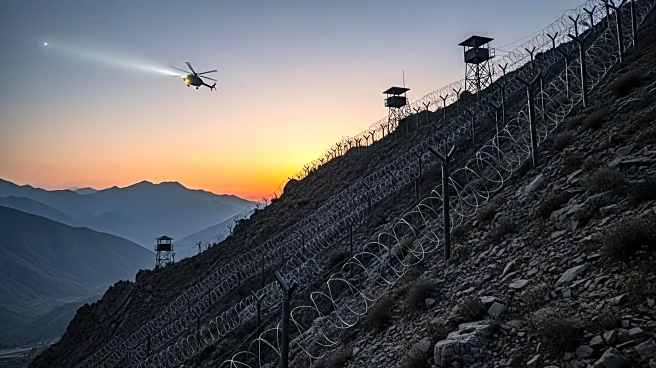What's Happening?
Recent border clashes between Pakistani and Afghan forces have resulted in significant casualties, with Afghan officials reporting the death of 58 Pakistani soldiers and Pakistan claiming to have killed 200 Taliban and affiliated 'terrorists'. The exchange of fire occurred at multiple locations along the border, including Angoor Adda, Bajaur, Kurram, Dir, and Chitral in Khyber Pakhtunkhwa province, and Bahram Chah in Balochistan. The Taliban administration accused Pakistan of carrying out bombings in Kabul and Paktika, which Pakistan has neither confirmed nor denied. The tensions have escalated due to Pakistan's accusations that the Taliban is providing refuge to the Tehrik-e Taliban Pakistan (TTP), an armed group responsible for numerous attacks inside Pakistan. The Taliban has denied these allegations, and the situation remains volatile.
Why It's Important?
The border clashes between Pakistan and Afghanistan have significant implications for regional stability and security. The ongoing conflict could exacerbate tensions in South Asia, affecting diplomatic relations and potentially leading to further military engagements. The accusations of harboring TTP fighters by the Taliban could strain Pakistan's internal security, as the TTP has been responsible for numerous attacks within the country. The situation also highlights the complex dynamics between the two nations, which have historically been allies but are now facing increasing hostility. The international community, including countries like Iran, Qatar, and Saudi Arabia, has urged restraint and dialogue to prevent further escalation and maintain regional peace.
What's Next?
Both Pakistan and Afghanistan are likely to seek diplomatic solutions to de-escalate the situation, as neither side wants a prolonged conflict. The involvement of international stakeholders, such as China and Russia, could play a role in mediating discussions and encouraging both countries to return to the negotiation table. However, the presence of the TTP remains a central issue, and unless addressed, tensions may persist. The Afghan government's refusal to acknowledge the TTP's presence on its soil continues to be a point of contention, and resolving this issue will be crucial for improving relations between the two countries.
Beyond the Headlines
The border clashes underscore the broader geopolitical challenges in South Asia, where historical grievances and security concerns often lead to military confrontations. The situation also raises questions about the Taliban's governance and its ability to control militant groups within Afghanistan. The potential for internal dissent within the Taliban ranks, due to their ties with the TTP, could further complicate efforts to stabilize the region. Additionally, the deportation of Afghan refugees by Pakistan adds another layer of complexity to the bilateral relations, as it affects millions of displaced individuals seeking safety and stability.










